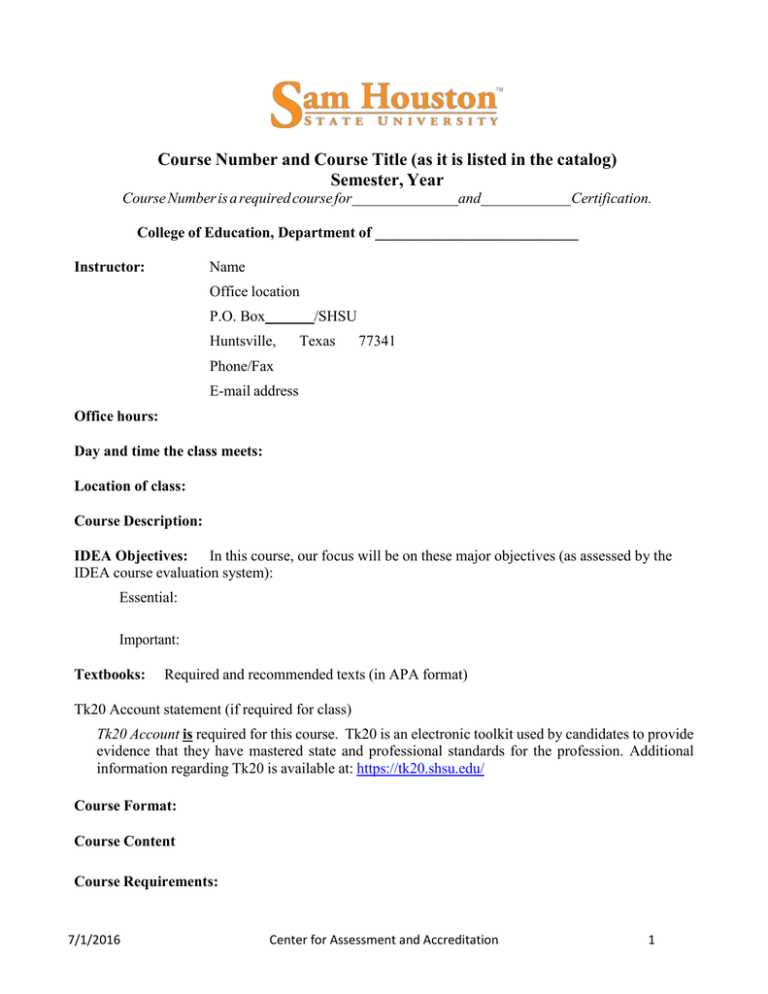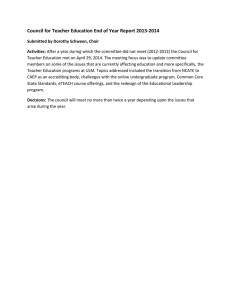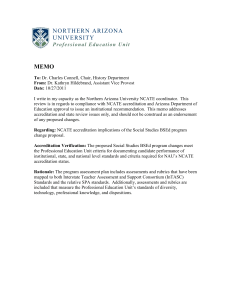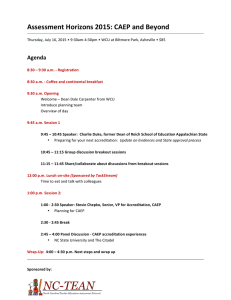Common Syllabi.
advertisement

Course Number and Course Title (as it is listed in the catalog) Semester, Year Course Number is a required course for and Certification. College of Education, Department of ___________________________ Instructor: Name Office location P.O. Box /SHSU Huntsville, Texas 77341 Phone/Fax E-mail address Office hours: Day and time the class meets: Location of class: Course Description: IDEA Objectives: In this course, our focus will be on these major objectives (as assessed by the IDEA course evaluation system): Essential: Important: Textbooks: Required and recommended texts (in APA format) Tk20 Account statement (if required for class) Tk20 Account is required for this course. Tk20 is an electronic toolkit used by candidates to provide evidence that they have mastered state and professional standards for the profession. Additional information regarding Tk20 is available at: https://tk20.shsu.edu/ Course Format: Course Content Course Requirements: 7/1/2016 Center for Assessment and Accreditation 1 Student Syllabus Guidelines SHSU Academic Policy Manual -- Students o Procedures in Cases of Academic Dishonesty #810213 o Disabled Student Policy #811006 o Student Absences on Religious Holy Days #861001 o Academic Grievance Procedures for Students # 900823 SHSU Academic Policy Manual – Curriculum and Instruction o Use of Telephones and Text Messagers in Academic Classrooms and Facilities #100728 Visitors in the classroom - Only registered students may attend class. Exceptions can be made on a case-by-case basis by the professor. In all cases, visitors must not present a disruption to the class by their attendance. NCATE Accreditation The Sam Houston State University, College of Education has the distinction of NCATE accreditation since 1954. As an NCATE accredited program, the College of Education ensures that the best-prepared teachers will be in classrooms teaching the next generation of leaders how to solve problems, communicate effectively, and work collaboratively. In November 2010, NCATE merged with the Teacher Education Accreditation Council (TEAC) to become the Council for the Accreditation of Educator Preparation (CAEP), combining the two premiere accrediting organizations as a single accrediting agency for reform, innovation, and research in educator preparation. SHSU will continue to be NCATE accredited through its next review scheduled for November 2015. NCATE Standards CAEP Standards The Conceptual Framework and Model The COE Conceptual Framework establishes the shared vision of the college in preparing educators to work with P-12 students through programs dedicated to collaboration in instruction, field experience, and research, the candidates in Sam Houston State University’s Educator Preparation Programs acquire the knowledge, dispositions, and skills necessary to create a positive learning environment preparing educators to work with P-12 students. Employing a variety of technologies, candidates learn to plan, implement, assess, and modify instruction to meet the needs of diverse learners. The Conceptual Framework (CF) incorporates five (5) indicators throughout the framework that serve to identify areas tied to course work where there is evidence of Conceptual Framework and goals assessment. The five indicators are: Knowledge Base (CF1), Technological Learning Environment (CF2), Communication (CF3), Assessment (CF4), and Effective Field Experience with Diverse Learners (CF5) 7/1/2016 Center for Assessment and Accreditation 2 SHSU Dispositions and Diversity Proficiency (DDP) Standards 1. DDP Demonstrates an attitude of reflection and thoughtfulness about professional growth and instruction. CF 2 2. Demonstrates a commitment to using technology to create an authentic learning environment that promotes problemsolving and decision making for diverse learners. 2 3. Practices ethical behavior and intellectual honesty. 3 4. Demonstrates thoughtfulness in communication and an awareness and appreciation of varying voices. Demonstrates knowledge of second language acquisition and a commitment to adapting instruction or programs to meet the needs of culturally and linguistically diverse learners. Demonstrates ability to be understanding, respectful and inclusive of diverse populations. Uses assessment as a tool to evaluate learning and improve instruction for all learners 3 8. Demonstrates a commitment to literacy, inquiry, and reflection. 1&4 9. Leads diverse learners to higher level thinking in cognitive, affective, and/or psychomotor domains. 5 5. 6. 7. 10. Demonstrates a commitment to adapting instruction or CAEP NCATE 1.1 (InTASC #10) & 3.3 1.5 & 3.4 1. c., 1.g., & 4. c 1.b, 4.a., & 6.d. 1.1(InTASC #9) , 3.3, & 3.6 3.1, 3.3 1.g. & 4.a. 3&5 1.1 (InTASC #2) 4.a.& 4.d. 3&5 3.1 4.a. & 4.d. 4 1.1 (InTASC #6) 1.1 (InTASC #9) & 3.3 1.1 (InTASC, & #2) 1.1 (InTASC #2 and #9), & 1.4, 2.3 1.d. & 4.a. 5 programs to meet the needs of diverse learners. 4.a. 1. d, 1. g., & 4.a. 4.a. 1.c., 3.c., 4.a., & 4.d. CF: Conceptual Framework CAEP: Council for the Accreditation of Educator Preparation (see page 20-21 of CAEP Standards for crosscutting themes and diversity characteristics) NCATE: National Council for the Accreditation of Teacher Education The Dispositions and Diversity Proficiency (DDP) Standards are administered and evaluated in prescribed courses to all educator preparation student in initial and advanced programs (please provide additional information for the candidate if the DDP is administered during your course). College of Education Information: Please be advised that the College of Education conducts ongoing research regarding the effectiveness of the programs. You will receive one survey in the final semester prior to graduation regarding the operations of the unit during your time here. A second survey will occur within one year following graduation from or completion of a program, and will be sent to you and to your employer. This survey will focus on the preparation received at SHSU. Please remember that your response to these surveys is critical to SHSU program excellence. 7/1/2016 Center for Assessment and Accreditation 3 Matrix (A blank example is provided below): Course Objectives - stated in measurable performance terms/behavior Course Activities/Assignments Performance Assessments Standards (either list the standards used or provide a link to the standards) • Required Program Standards (SPA – i.e., ACEI, NMSA etc.) • NCATE/CAEP Standard 1 (all applicable elements) used when there is not a SPA • State Standards/Competencies for certification if applicable • Diversity and Disposition Proficiencies • Conceptual Framework Alignment • ISTE NETS*S Technology Standards (for technology integrated curriculum) Topic(s)/Objective(s) Activities/Assignments (including field based activities) Measurement (including performance based) Standards Alignment S—SPA Standard Alignment TS—Texas Educator Standards/Competencies DDP—Diversity and Disposition Proficiencies CF—Conceptual Framework Indicator N/C—NCATE/CAEP Standard 1 (if there is no SPA) NETS*S – ISTE NETS Technology Standards for Students Program specific URL address for Specialty Program Association (SPA) standards: State Standards: htt p:/ /www.t ea.st at e.tx.us/i ndex2.aspx? id=5938 Course Evaluation: Expectations: Bibliography: 7/1/2016 Center for Assessment and Accreditation 4


